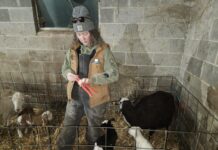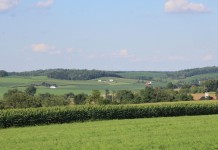MADISON, Wis. – Spring is a popular time for children to take field trips to nearby farms. Getting close to farm animals is often the most popular part of these visits, but it poses some risks to both the visitors and the animals.
Precautions. Some simple precautions can help to ensure that the visit is safe for children, says Barbara Ingham, food scientist.
Researchers reported in a recent issue of the New England Journal of Medicine that children who have contact with farm animals run the risk of being infected by E. coli bacteria if they do not wash their hands before eating.
Researchers reached the conclusion after studying an outbreak of E. coli O157:H7 illness among preschoolers who visited a Pennsylvania farm
Cattle are known to harbor the E. coli bacteria, which kills about 60 people in the United States each year and sickens more than 70,000.
Signs. Infection with the bacteria may cause people to develop bloody diarrhea, fever, and vomiting, with symptoms particularly severe in children and the elderly. Death or kidney failure may result.
“Children should be instructed to wash their hands after touching farm animals,” Ingham said. “If they put their hands in their mouths or handle food, they are at risk. Children should not be given treats or lunches near the animals and everyone should wash their hands before handling food and eating.
“Because younger children cannot keep their hands out of their mouths, they should not touch the animals.”
Hygiene. “Older kids will understand proper hygiene when it is explained to them,” Ingham said. “If you let them feed or pet the animals, have them clean and dry their hands with soap and running water immediately after.
“Waterless hand cleaners and hand wipes are not proven to be effective with the pathogens encountered on farms.”
Greater risk. Certain farm animals have a greater risk for transmitting infections to humans.
In general, calves, cows that have just calved and sick animals are more likely to shed human pathogens as compared with other farm animals. They are also the most likely to acquire contagious animal diseases.
Visitors should not enter calving pens and sick cow areas. This precaution will also help keep children away from syringes that have been used for cow health care.









